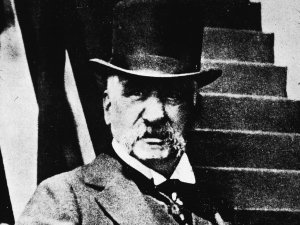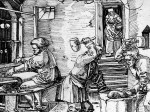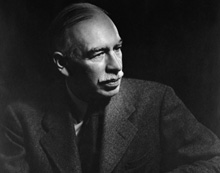Archive for the ‘History of Economics’ Category
Link: https://podcasts.apple.com/us/podcast/news-not-noise/id1585743634?i=1000550850554
New York Times bestselling author Alec Ross talks about his new book, The Raging 2020s, and explains how that restore the balance of power between the government, businesses, and citizens a new social contract is needed for modern America.
Discussion Prompt: After listening to the podcast, do you agree that America needs a new social contract for the economy to thrive? While answering this question, use your economic thinking and reflect on ideas like wealth inequality, taxes, and unions.
Original Air Date: February 12, 2022
Length: 32 minutes 28 seconds
Link: https://www.imf.org/en/News/Podcasts/All-Podcasts/2017/11/11/the-long-life-of-keynesian-economics
Keynesian economics was particularly popular after the Great Depression. Keynes revolutionized how government involvement in the economy was seen. Keynesian theories are still applied in financial crises today.
Original Air Date: October 16, 2014
Length: 7 minutes
Link: https://www.economist.com/open-fut ture/2018/08/16/what-would-adam-smith-say-about-capitalism-today
Anne McElvoy of The Economist delves into the life of the father of economics, Adam Smith in this podcast. Many of the same issues that Adam Smith discussed in the 1700s are still being disputed today. In the current political economy there are still debates of free trade vs. protectionism, unregulated markets, how much tax is too much tax, and how to make the economy work for every social class.
Discussion Prompt 1: How would the Adam Smith feel about the current degree of government involvement in the economy? Should governments be able to regulate economic markets?
Original Air Date: August 16, 2018
Length: 19 minutes 13 seconds

Link: http://www.npr.org/sections/money/2015/07/24/426017148/episode-641-why-we-work-so-much
Summary: John Maynard Keynes believed that in the future people would work less, he was wrong. The Planet Money team explain the reasons why this has yet to change.
Original Air Date: July 24, 2015
Length: 13 mins 11 sec
 Link: http://www.npr.org/blogs/money/2014/02/28/283477546/the-invention-of-the-economy
Link: http://www.npr.org/blogs/money/2014/02/28/283477546/the-invention-of-the-economy
Summary: ‘The Economy’ is ever-present in today’s conversations but it was not always this way. This podcast describes the emergence of the phrase ‘The Economy’ and Gross Domestic Product.
Original Air Date: February 28, 2014
Length: 4 minutes 29 seconds
 Link: http://www.npr.org/blogs/money/2014/01/17/263487421/episode-510-the-birth-of-the-minimum-wage
Link: http://www.npr.org/blogs/money/2014/01/17/263487421/episode-510-the-birth-of-the-minimum-wage
Summary: Planet Money takes us back through time to when the U.S. first set a minimum wage. Historically, the U.S. had rejected any attempts at a minimum wage law, considering them unconstitutional. But things changed after Franklin D. Roosevelt signed the Fair Labor Standards Act of 1938.
Original Air Date: January 17, 2014
Length: 17 min
 Link: http://www.npr.org/blogs/money/2013/12/20/255839292/episode-505-a-locked-door-a-secret-meeting-and-the-birth-of-the-fed
Link: http://www.npr.org/blogs/money/2013/12/20/255839292/episode-505-a-locked-door-a-secret-meeting-and-the-birth-of-the-fed
Summary: An historical retelling of the creation of the Federal Reserve Bank
Original Air Date: December 20, 2013
Length: 15 min
 Link: http://onpoint.wbur.org/2013/04/10/capitalism
Link: http://onpoint.wbur.org/2013/04/10/capitalism
Summary: Host Tom Ashbrook interviews History Professors Julia Ott and Louis Hyman to discuss the history of capitalism, its record of economic and social performance, and its future, particularly in the post Cold War context.
Original air date April 10, 2013
Length: 46:01
 Link: http://www.freakonomics.com/2010/03/24/freakonomics-radio-what-would-the-world-look-like-if-economists-were-in-charge/
Link: http://www.freakonomics.com/2010/03/24/freakonomics-radio-what-would-the-world-look-like-if-economists-were-in-charge/
Summary: To what extent would the world change if economists ran the world? The podcast interviews Estonian prime minister, Mart Laar, who revamped his economy based on the teachings of Milton Friedman; and Friedman’s grandson, Patri Friedman, who want to build cities in the middle of the ocean.
Original Air Date: March 24, 2010
Length: 20 min
Link: http://www.npr.org/blogs/money/2012/03/27/149484066/the-tuesday-podcast-what-a-16th-century-guild-teaches-us-about-competition

Summary: Sheilagh Ogilvie, an economic historian at Cambridge University, outlines the importance of guilds in the 16th century and how their political and economic structures parallel modern workplaces and markets.
Original air date: March 27, 2012
Length: 30:15 min









